牛津沪教四上Module 1《Unit 3 What are you》(period1)word教案
- 格式:doc
- 大小:40.50 KB
- 文档页数:4
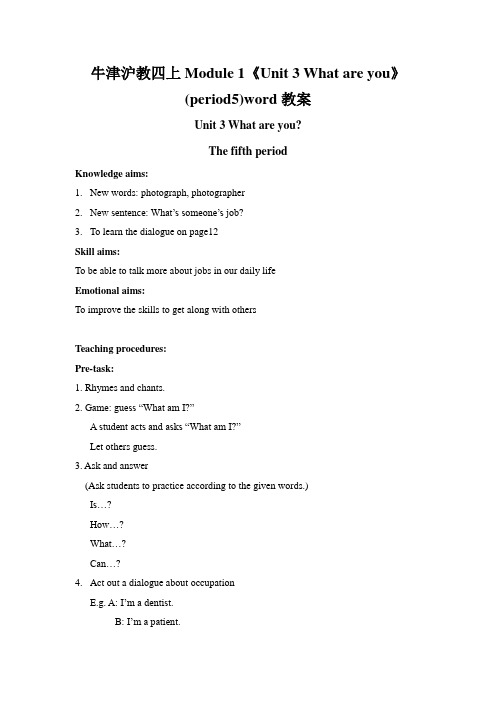
牛津沪教四上Module 1《Unit 3 What are you》(period5)word教案Unit 3 What are you?The fifth periodKnowledge aims:1.New words: photograph, photographer2.New sentence: What’s someone’s job?3.To learn the dialogue on page12Skill aims:To be able to talk more about jobs in our daily lifeEmotional aims:To improve the skills to get along with othersTeaching procedures:Pre-task:1. Rhymes and chants.2. Game: guess “What am I?”A student acts and asks “What am I?”Let others guess.3. Ask and answer(Ask students to practice according to the given words.)Is…?How…?What…?Can…?4.Act out a dialogue about occupationE.g. A: I’m a dentist.B: I’m a patient.B: May I come in?A: Come in, please.B: Good morning, Mr. Li.A: What’s the trouble?B: I have a toothache.A: Let me have a look. Please open the mouth, say “Ah”…5.Read and write “T” or “F”Hello. My Name is Grace. I’m ten years old. I’ve got a brother. His name is David. He is 18 years old. He is tall and fat. My father is a shop assistant. He can draw well. My mother is a waitress. She can cook.( ) There are three people in Grace’s family.( ) David is Grace’s father.( ) Grace’s mother is a shop assistant.( ) Grace’s brother is bi g and tall.( ) Grace’s mother can cook.While-task:I. New words learning:1.photographT: Look! What’s this?It’s a photograph. It’s a photograph of my family.1)Complete the word: _ _otogra_ _2)Read3)Make sentences or phrases with “photograph”2.photographerT: Look! This is my father. He can take photos very well. He’s a_________.1)(Show the word “photographer”) Look at the word of “photographer” and tryto read it.2)Read together.3)How about: read- sing- dive-II. New sentence: What’s someone’s job?T: Do you know my father’s job now? What’s my father’s job? It means “What does my father do?” “What is my father?”S: He’s a photographer.1.Show the new sentence2.Read together.3.Ask your deskmate’s family member’s job with the new sentence.III. Dialogue1.Listen to the tape2. Answer some questions about the dialogue.3. Read after the tape together.4.Practice the dialogue in groups.Post-task:1. Act out this dialogue.2. Make a new dialogue according to the dialogue on the text book.3. Do a surv ey on your classmates’ family members’ jobs and so on and have areport based on your survey.。
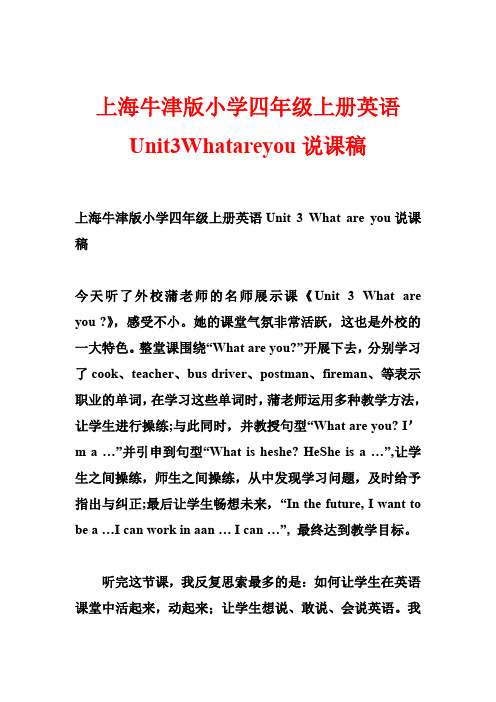
上海牛津版小学四年级上册英语Unit3Whatareyou说课稿上海牛津版小学四年级上册英语Unit 3 What are you说课稿今天听了外校蒲老师的名师展示课《Unit 3 What are you ?》,感受不小。
她的课堂气氛非常活跃,这也是外校的一大特色。
整堂课围绕“What are you?”开展下去,分别学习了cook、teacher、bus driver、postman、fireman、等表示职业的单词,在学习这些单词时,蒲老师运用多种教学方法,让学生进行操练;与此同时,并教授句型“What are you? I’m a …”并引申到句型“What is heshe? HeShe is a …”,让学生之间操练,师生之间操练,从中发现学习问题,及时给予指出与纠正;最后让学生畅想未来,“In the future, I want to be a …I can work in aan … I can …”, 最终达到教学目标。
听完这节课,我反复思索最多的是:如何让学生在英语课堂中活起来,动起来;让学生想说、敢说、会说英语。
我总结了以下几点:一、以各种情境激发思维语言的应用需要环境,在汉语语境下的英语课堂里,只有有效地创设英语的交际氛围,才能使学生身临其境地交流、学习。
1、模拟交际情境情境表演最能满足学生的表现欲。
为了表演成功,学生往往会积极而精心地设计表演内容,而在这一过程中,学习内容已嵌入学生的脑子里。
例如学习了见面打招呼、互相介绍的句子后,引导学生模拟真实的生活情境,在课堂上表现出来,从Hello!Nice to meet you!到Goodbye!See you!从姓名What’s your name?到年龄How old are you?亦或其它的问题,老师都可以引导学生按照预定的目标进行情境表演。
2、创设生活情境人如果脱离了生活就学不会语言,学汉语如此,学英语也是如此。
如果教师把课堂变成一个浓缩的社会,让课堂活起来,让学生在生活情景中学英语,在体验中学英语,在实践中学英语,学生就会学得主动、生动、快乐。

沪教牛津版四年级上册英语Module 1 Getting to know youUnit 3 What are you?The First PeriodKnowledge objective:ing nouns to identify people (fireman, policeman…)2.Asking ‘Wh-‘ questions to find out a person’s identity.(What’s he/she?)ing nouns to identify peop le, and events.(She’s a policewoman.)ing nouns to identify people.(He’s a bus-driver.)Skill objective:1.Open an interaction by eliciting a response.2. Predict the meaning of unfamiliar words by using context or picture cues. Emotion objective:1. Educate the students to love people all around them.Materials:Student’s Book 4A page 8MediaTeaching procedures:I. Pre-task preparation:a. Chant.b. Ask and answerc. Revision: ( Playing a guessing game)Review the words about professions they have learned.(doctor, nurse, cook, teacher, policeman, farmer, postman)Ask pupils to write numbers 1—7 on a piece of paper. Tell them you are going to give them some information about Linda’s family and ask them to guess what they are, then write down the answers, at last, exchange their answers.II. While-task procedure:1.Words: fire, fireman, firemenA.Show the picture of the fire.B.Read the word. fire ,lion, like,C.Word groups.big fire, small fire, play with the fire, fireman, firemen a strong fireman, a tall fireman, some firemen.D. Talk about the fire.Fire can make us warm.Don’t play with the fire.The firemen are brave.2.Words: telephone ,bring, engineA: If you see the big fire, What are you going to do? Telephone one one nineBring the engine.B. Read the words.Spell and read.C.Ask the weather. Telephone one two one Telephone one two o. What do you need? Ambulance an ambulance man(Read the word and express)D. Read and spellAsk pupils to fill in the blanks.Eg: 1) The a_____ man is in the ambulance.2) Mr. Smith is a good p____ at the police station.3) Is he a f_____? Yes, he is in the engine…E. What about the engine and ambulance.What colour ?...3.Sentence Structure:A.Show the pictures to elicit the sentence patterns: What ‘s he? What ‘s she? Divide the class into two groups. Group A keeps all the Picture Cards while Group B keeps all the Word Cards. The pupils in Group A take turns to choose a Picture Card, hold it up and ask: What’s he/she? To elicit: He’s/She’s…Continue the game by ha ving Group B ask the questions and Group A answering them. One score for each correct answer. The group with the highest score will be the winner.B.Sound.C.Practice in pair.What’s he? What’s she?D.What’s your father?What’s your mother?What’s your uncle?What are you?4. Listen to the tape and fill in the blanksLook at the ___ ____ ____.Telephone ____ _____ ____Bring the ____ _____ _____.Here are the _____ _____ _____.5. Read the rhyme6. Make a new rhyme. (First have a discussion in groups of four)A. Introduce some special telephone numbers.Eg:120 救护车114 电话号码咨询110 警察局12121 天气预报B. Gives a model.Look at the old man.He is ill. He is ill.Telephone 120Bring the ambulance,Ambulance, ambulance!Here are the ambulance men,ambulance men, ambulance men!III. Post-task procedure:1. Do a Survey “Which is the most popular profession?”A. Give them a time limit and then each pupil walks around asking as many other pupils as possible the question: “What’s your father?/ What’s your mother?” They write the answers on the paper.B. Back in their groups, pupils compare their answers and decide which is the most popular profession.IV. Homework.1.Listen and read the rhyme on page 8.2. Copy the words and sentences.3. Make the rhymes.。
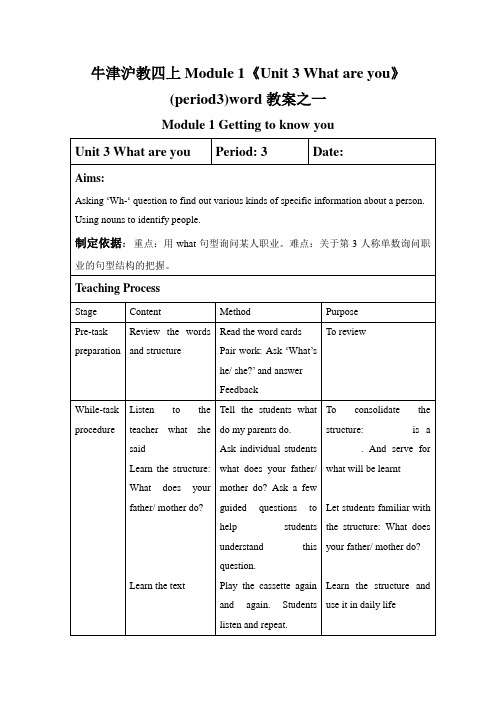
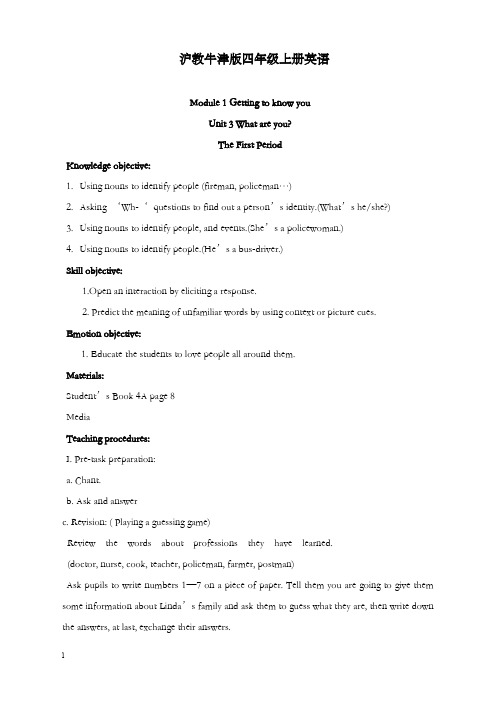
沪教牛津版四年级上册英语Module 1 Getting to know youUnit 3 What are you?The First PeriodKnowledge objective:ing nouns to identify people (fireman, policeman…)2.Asking ‘Wh-‘questions to find out a person’s identity.(What’s he/she?)ing nouns to identify people, and events.(She’s a policewoman.)ing nouns to identify people.(He’s a bus-driver.)Skill objective:1.Open an interaction by eliciting a response.2. Predict the meaning of unfamiliar words by using context or picture cues.Emotion objective:1. Educate the students to love people all around them.Materials:Student’s Book 4A page 8MediaTeaching procedures:I. Pre-task preparation:a. Chant.b. Ask and answerc. Revision: ( Playing a guessing game)Review the words about professions they have learned.(doctor, nurse, cook, teacher, policeman, farmer, postman)Ask pupils to write numbers 1—7 on a piece of paper. Tell them you are going to give them some information about Linda’s family and ask them to guess what they are, then write down the answers, at last, exchange their answers.II. While-task procedure:1.Words: fire, fireman, firemenA.Show the picture of the fire.B.Read the word. fire ,lion, like,C.Word groups.big fire, small fire, play with the fire, fireman, firemen a strong fireman, a tall fireman, some firemen.D. Talk about the fire.Fire can make us warm.Don’t play with the fire.The firemen are brave.2.Words: telephone ,bring, engineA: If you see the big fire, What are you going to do? Telephone one one nineBring the engine.B. Read the words.Spell and read.C.Ask the weather. Telephone one two one Telephone one two o. What do you need? Ambulance an ambulance man(Read the word and express)D. Read and spellAsk pupils to fill in the blanks.Eg: 1) The a_____ man is in the ambulance.2) Mr. Smith is a good p____ at the police station.3) Is he a f_____? Yes, he is in the engine…E. What about the engine and ambulance.What colour ?...3.Sentence Structure:A.Show the pictures to elicit the sentence patterns: What ‘s he? What ‘s she?Divide the class into two groups. Group A keeps all the Picture Cards while Group B keeps all the Word Cards. The pupils in Group A take turns to choose a Picture Card, hold it up and ask: What’s he/she? To elicit: He’s/She’s…Continue the game by having Group B ask the questions and Group A answering them. One score for each correct answer. The group with the highest score will be the winner.B.Sound.C.Practice in pair.What’s he? What’s she?D.W hat’s your father?What’s your mother?What’s your uncle?What are you?4. Listen to the tape and fill in the blanksLook at the ___ ____ ____.Telephone ____ _____ ____Bring the ____ _____ _____.Here are the _____ _____ _____.5. Read the rhyme6. Make a new rhyme. (First have a discussion in groups of four)A. Introduce some special telephone numbers.Eg:120 救护车114 电话号码咨询110 警察局12121 天气预报B. Gives a model.Look at the old man.He is ill. He is ill.Telephone 120Bring the ambulance,Ambulance, ambulance!Here are the ambulance men,ambulance men, ambulance men!III. Post-task procedure:1. Do a Survey “Which is the most popular profession?”A. Give them a time limit and then each pupil walks around asking as many other pupils as possible the question: “What’s your father?/ What’s your mother?”They write the answers on the paper.B. Back in their groups, pupils compare their answers and decide which is the most popular profession.IV. Homework.1.Listen and read the rhyme on page 8.2. Copy the words and sentences.3. Make the rhymes.。
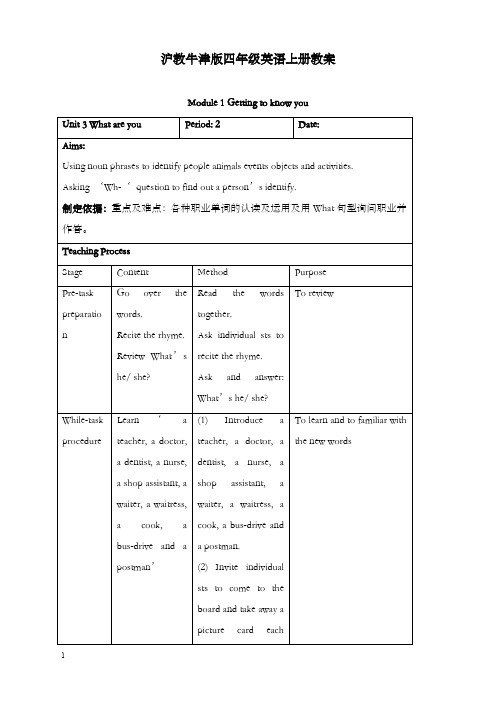
牛津沪教四上Module 1《Unit 3 What are you》(period4)word教案Unit 3 What are you?The fourth periodKnowledge aims1. New sentences: What am I? You’re a …. Are you a…? Yes,/No, I’m….2. New words: pilot, writerSkill aims:To be able to talk more about jobs with othersEmotional aims:To learn more about jobs and to know what they want to be in the future then to study hard to realize their dreams.Teaching procedures:Pre-task preparation:Rhymes.Play a game: Who has the best memory?To let them see twelve jobs on twelve cards for about half a minute. Then turn over the cards. And ask students what job is behind each card.Ask and answerT: What does your father do? Can he draw?What does your mother do? Can she speak English?What does her Grandma do? Can she dance?What do you do? Can you read?Revision on jobs.(1)Introduce one of your family members. Say something about his/her job and so on.(2) Ask and answer according to the introduction.E.g. What does Betty’s father do?What can he do?Is he tall?While-task procedure:New sentences learning1. What am I? You’re….ElicitT: Look! I have a gun. I am wearing dark blue uniform. What am I?P: You’re a policewoman.T: Yes, I’m a policewoman.(T shows the sentences) Read the new sentences.Work in pairsP1: What am I?P2: You’re a driver.P1: Yes, I am a driver.2. Are you a…?Elicit:(1) Ask students to take turns to choose a card and act.P1: What am I?T: Are you a dentist?P1: Yes, I’m…/No, I’m…(2) (Show the sentences) students read after the teacher(3) Listen to the tape, read after the tape.(4) Work in groups. Play a game. What am I?II. New words.pilot, writer1) Show the pictures with some words those are not completed._ _ lot writ_ _Look,they are my friends. What are they? Let me tell you they are pilot and writer.Please complete the two words.2) Listen and complete.3) Read4)Try to say something about these jobs.Post- task:1.Read the four new words.2.Quick response to the four words according to pictures.3.Draw a picture that what you want to be in the future4.Let others to guess what you want to be with the new sentences we’ve learned. What am I? Are you a …? Yes, / No, …..5. Try to introduce yourself in the future.。
Module 1 Getting to know youUnit 3 What are you?The fifth period Knowledge aims:1.New words: photograph, photographer2.New sentence: What’s someone’s job?3.To learn the dialogue on page12Skill aims:To be able to talk more about jobs in our daily life Emotional aims:To improve the skills to get along with othersTeaching procedures:Pre-task:1. Rhymes and chants.2. Game: guess “What am I?”A student acts and asks “What am I?”Let others guess.3. Ask and answer(Ask students to practice according to the given words.)Is…?How…?What…?Can…?4.Act out a dialogue about occupation. A: I’m a dentist.B: I’m a patient.B: May I come in?A: Come in, please.B: Good morning, Mr. Li.A: What’s the trouble?B: I have a toothache.A: Let me have a look. Please open the mouth, say “Ah”…5.Read and write “T” or “F”Hello. My Name is Grace. I’m ten years old. I’ve got a brother. His name is David. He is 18 years old. He is tall and fat. My father is a shop assistant. He can draw well. My mother is a waitress. She can cook.( ) There are three people in Grace’s family.( ) David is Grace’s father.( ) Grace’s mother is a shop assistant.( ) Grace’s brother is big and tall.( ) Grace’s mother can cook.While-task:I. New words learning:1.photographT: Look! What’s this?It’s a photograph. It’s a photograph of my family.1)Complete the word: _ _otogra_ _2)Read3)Make sentences or phrases with “photograph”2.photographerT: Look! This is my father. He can take photos very well. He’s a_________.1)(Show the word “photographer”) Look at the word of “photographer” and tryto read it.2)Read together.3)How about: read- sing- dive-II. New sentence: What’s someone’s job?T: Do you know my father’s job now? What’s my father’s job? It means “What does my father do?” “What is my father?”S: He’s a photographer.1.Show the new sentence2.Read together.3.Ask your deskmate’s family member’s job with the new sentence.III. Dialogue1.Listen to the tape2. Answer some questions about the dialogue.3. Read after the tape together.4.Practice the dialogue in groups.Post-task:1. Act out this dialogue.2. Make a new dialogue according to the dialogue on the text book.3. Do a survey on your classmates’ family members’ jobs and so on and have areport based on your survey.。